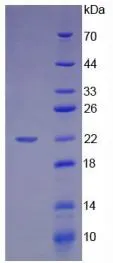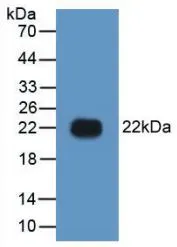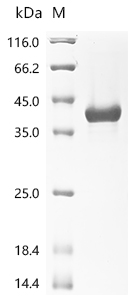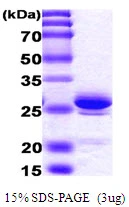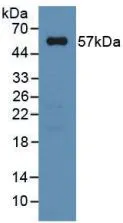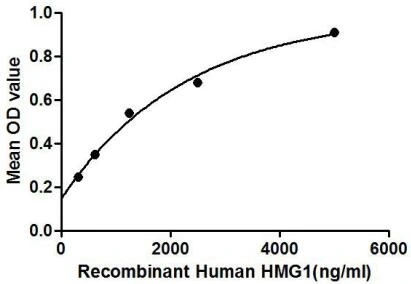
Functional ELISA analysis of GTX00153-pro Human HMGB1 protein which can bind immobilized SDF1 protein.
Human HMGB1 protein, His tag
GTX00153-PRO
ApplicationsFunctional Assay
Product group Proteins / Signaling Molecules
Protein IDP09429
Overview
- SupplierGeneTex
- Product NameHuman HMGB1 protein, His tag
- Delivery Days Customer9
- Application Supplier NoteHigh Mobility Group Protein 1 (HMG1) is among the most important chromatin proteins. In the nucleus HMGB1 interacts with nucleosomes, transcription factors, and histones. This nuclear protein organizes the DNA and regulates transcription. Besides, Stromal Cell Derived Factor 1 (SDF1) has been identified as an interactor of HMG1, thus a binding ELISA assay was conducted to detect the interaction of recombinant human HMG1 and recombinant human SDF1. Briefly, HMG1 were diluted serially in PBS, with 0.01% BSA (pH 7.4). Duplicate samples of 100 microl were then transferred to SDF1-coated microtiter wells and incubated for 2h at 37C. Wells were washed with PBST and incubated for 1h with anti-HMG1 pAb, then aspirated and washed 3 times. After incubation with HRP labelled secondary antibody, wells were aspirated and washed 3 times. With the addition of substrate solution, wells were incubated 15-25 minutes at 37C. Finally, add 50 microl stop solution to the wells and read at 450nm immediately. The binding activity of of HMG1 and SDF1 was in a dose dependent manner.
- ApplicationsFunctional Assay
- CertificationResearch Use Only
- ConjugateUnconjugated
- Gene ID3146
- Target nameHMGB1
- Target descriptionhigh mobility group box 1
- Target synonymsHMG-1, HMG1, HMG3, SBP-1, high mobility group protein B1, Amphoterin, Sulfoglucuronyl carbohydrate binding protein, high-mobility group (nonhistone chromosomal) protein 1
- Protein IDP09429
- Protein NameHigh mobility group protein B1
- Scientific DescriptionThis gene encodes a protein that belongs to the High Mobility Group-box superfamily. The encoded non-histone, nuclear DNA-binding protein regulates transcription, and is involved in organization of DNA. This protein plays a role in several cellular processes, including inflammation, cell differentiation and tumor cell migration. Multiple pseudogenes of this gene have been identified. Alternative splicing results in multiple transcript variants that encode the same protein. [provided by RefSeq, Sep 2015]
- Storage Instruction-20°C or -80°C,2°C to 8°C
- UNSPSC41116100
- SpeciesHuman

